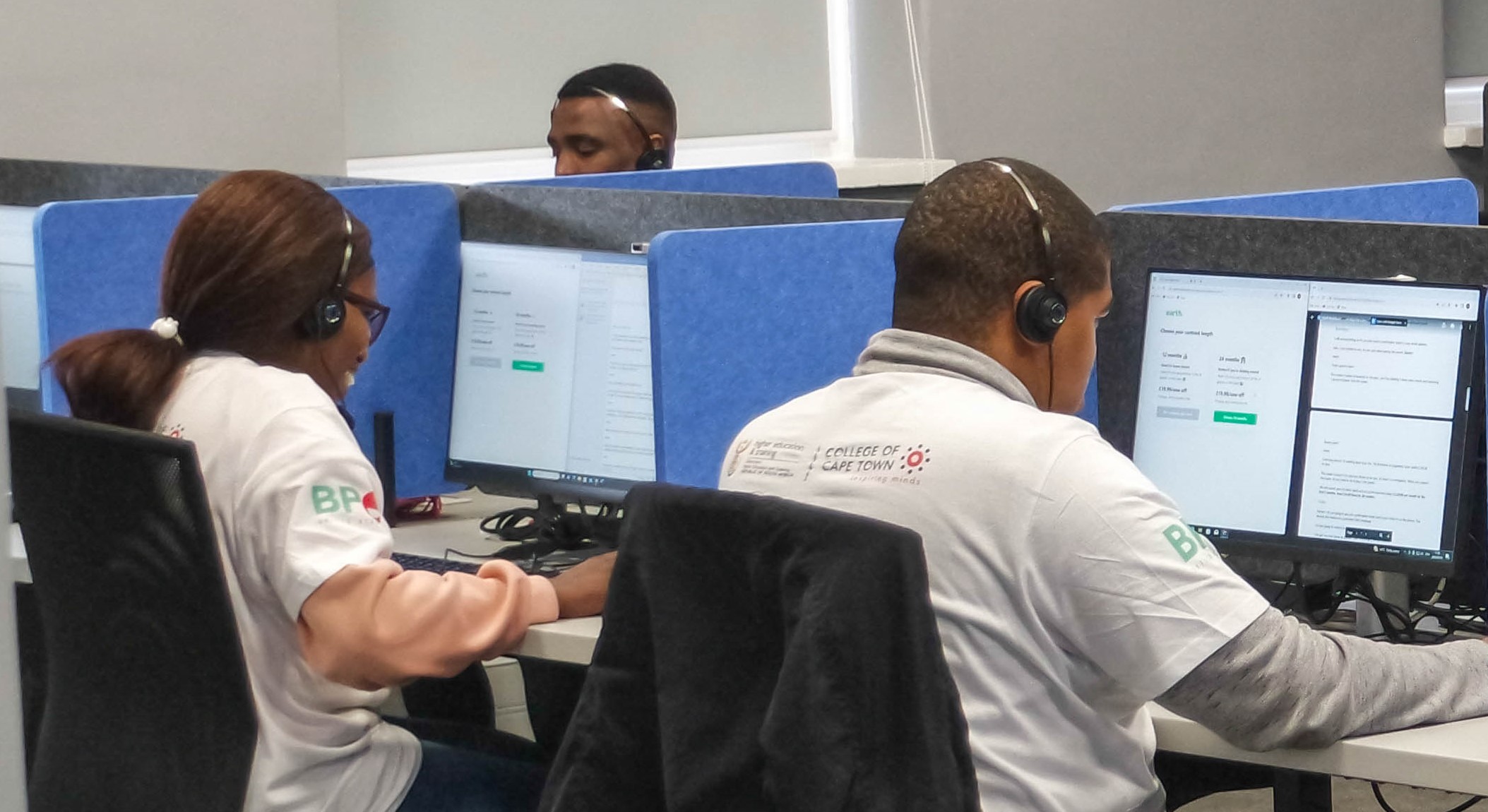BPO Skills Development
(Western Cape Government)

Background
The Business Process Outsourcing Skills Development Project facilitates experiential learning and work placement opportunities for unemployed youth in the Western Cape’s Business Process Outsourcing (BPO) sector, to improve the future employment prospects of participants between the ages of 18 - 35 years.
This 4 to 12-month placement opportunity enables learners with limited skills to be exposed to a dynamic, growing and challenging sector.
The most challenging long-term priority for the economy is a better educated and more skilled workforce. The BPO skills development project, aims to improve the employability of participants through exposure to the workplace and the dynamic world of call-centres.
The includes both certified training, behavioural training and product training to complement the practical work experience they receive daily. The project also includes a mentorship programme to facilitate growth.
The nature of call-centres is one which facilitates exposure to many businesses brands which require a wide variety of skills, most notably Customer Service, Sales and Lead Generation.
Stakeholders
We partner with various stakeholders such as Industry, TVET Institutions, NGOs, Sector Development Agencies and Provincial Departments.
Criteria for host companies
To be considered to participate in the Work & Skills Programme, companies need to:
- Be registered entities in the Business Process Outsourcing Sector;
- Provide written commitment to provide at least 80% employment to beneficiaries after the experiential placement period;
- Provide training to learners during the experiential learning period
- Provide mentorship for the learners to ensure the appropriate support, skills transfer and assessment of participants.
Benefits to host companies
- Matching of skills demand and supply;
- The programme allows the business to focus on developing the learner(s) aligned to specific skills required; and
- Allow the company to access the intern during the placement period.
Cost to host companies:
-
Training costs
-
Time allocated to learners
Criteria for learners to be recruited by host companies
- Must be between 18 and 35 years of age;
- Have Matric (or an equivalent qualification). Depending on the entrance requirements of some industries, a lower qualification may be accepted;
- Be an unemployed South African citizen who reside in the Western Cape;
- Learners should not be repeating the internship; and
- Learners should not be existing workers of the company or its subsidiary companies hosting the learner(s).
Expression of Interest and Commitment to Employment
The Department would like to invite all organisations that have the capacity to provide experiential learning opportunities to youth through the provisioning of meaningful employment opportunities, to contact the department through the email below. It would be expected that firms have the capacity to provide further employment to interns subsequent to the department’s stipend support.
The Department further invites lead organisations, that have the capacity to act as the lead employer of interns to be hosted at host organisations, through the email below. The lead organisation would be expected to remunerate intern stipends, which will be reimbursed by the department, and stipend top-ups. The department will not compensate lead companies for any facilitation of interns at host companies.
Downloads: Expression of Interest , Declaration of Interest (companies), Commitment to Employment and Motivation letter with EoI
Contact details: Dedat.Placement@westerncape.gov.za
How to apply?
There are two types of application, the first type is a Lead Company Application and the second is a Host Company application.
A Lead Company application is where, amongst other things, the Lead Company onboards and pays the learners a stipend on behalf of the Department. The Department will refund you. This model assists the Host Companies by ensuring they can focus on the practical and training aspects of the programme without being overburdened by administration. In this scenario, you are not required to be a BPO Organization, but are required to meet certain other criteria.
The Host Company application is where, the Host Company (The BPO Company) not only trains and provides learners with practical work experience, but also pays and manages the compliance aspects. This application requires that you are a BPO organization.
There are certain basic requirements that need to be met. The extent to which you can exceed those requirements improves the experience for the learner and thus increases the likelihood your application will be accepted.
- You provide training to learners: This could include soft skill training, behavioural training, product training or work specific training. The types of training are ranked in ascending order in terms of their benefit to learner from in-house training, vendor certification training and SETA accredited training.
- You place (or commit to place) at least 80% of the learners remaining on the programme after the completion: Anything in excess of the 80% will increase your score.
- You pay the learners a minimum top-up (over and above the stipend) of R500: Anything in excess of this increases your score. If different learners receive different top ups provide a detailed breakdown of the quantities and weighted average value for all learners.
- The total cost to company is not a minimum requirement, but the more you spend on the learner through either top-up, training or other benefits, the greater your score.
If you chose to proceed:
-
Download Expression of Interest , Declaration of Interest (companies), Commitment to Employment and Motivation letter with EoI
-
Complete them and submit to Dedat.Placement@westerncape.gov.za.
Be sure to get your applications in before 01st of April 2024 for the next round of BPO experiential learning programmes and help the youth of the province reach their potential.


